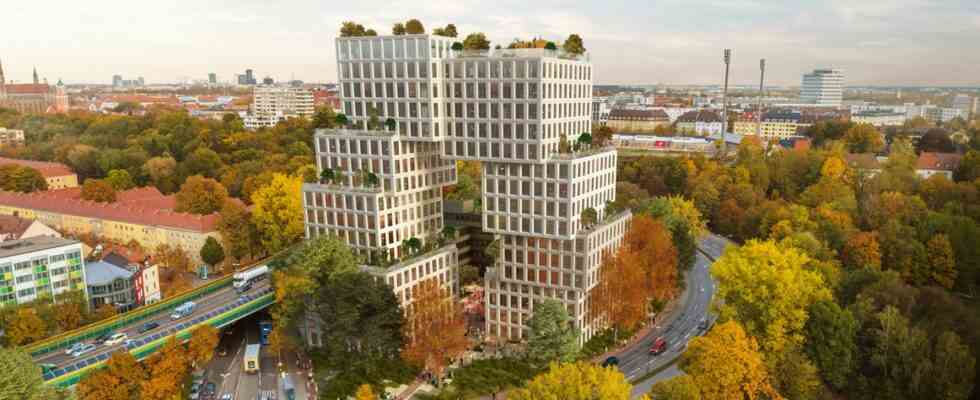The planned Candid-Tor in Untergiesing remains an unpopular project, despite the promised public added value, as the most recent residents’ meeting showed once again. The city should therefore either reject the 64-meter-high archway on the medical center site at Candidplatz or at least present independent studies on traffic pollution, shading, light pollution and other impending disadvantages.
District committee chief Sebastian Weisenburger (Greens) promised the citizens’ roundtable with voting options at the end of May at the end of an information evening that participants had criticized as a promotional event for investors. The Starnberg office Ehrlich+Klein, in cooperation with Hamburg-based Values Real Estate, is still planning a complex intended primarily for offices and medical service providers. They have not yet submitted a building application, since the necessary expansion of building rights will only be possible via a project-related development plan.
At the city level, only the City Planning Commission has so far made a statement – mostly skeptical. The district committee (BA) rejects the planning, at least in its current form, and calls for an overall view of the square. Right at the beginning of the meeting, however, Weisenburger classified his committee’s right to have a say as “formally equal to zero”. However, the BA, like the residents, is at least consulted in the development plan process.
He received a clear “no” mandate from the assembly: around a hundred residents had come, 18 of them made 35 consistently critical applications. The meeting also accepted the most far-reaching option, namely to reject the plan across the board. The applicant’s justification that the project does not fit into a district whose “value system is not yet exclusively oriented towards money” made it clear that many people in Lower Giesingen apparently do not want to accept gentrification as inevitable.
In addition to cultural and class struggles, more pragmatic objections were also heard: Among other things, a building according to the highest energy efficiency standard KfW 40+ is required, as well as shading studies that, unlike those previously submitted, also take into account the low winter sun. Noise and air pollution as well as nocturnal light pollution and their effects on the fauna and flora in the Auer Mühlbach, which are worth protecting, should also be examined independently and more closely.
Problems in the housing market could be exacerbated
While the corresponding motions were accepted almost or completely unanimously, not everyone present was convinced of the desire to protect the existing medical center, which dates from the 1970s, as a monument. The application to involve the competent state office was narrowly accepted with 20 to 19 votes. The majority, but not completely convinced, the meeting was also of the demand of the opponents’ initiative “Candidplatz für Alle”, according to which investors should disclose all figures on the purchase price, financing and yield forecast.
Georg Renoth calculated that they not only miscalculated using the office, but could also exacerbate the problems on the housing market. Once in a higher position in the planning department for ten years, Renoth took the project to court just as harshly as the – albeit customary – assignment and payment of experts by the investor. Meanwhile, the organized goal opponents demonstratively do not want to get into his boat. Her spokesman Benjamin Ruß reported that planner Michael Ehrlich had recently invited him “for a beer or a coffee” for a personal interview – and was rebuffed. There are conflicting interests and they want to decide on an open stage who will prevail, says Russ, the “backroom method” has had its day.

